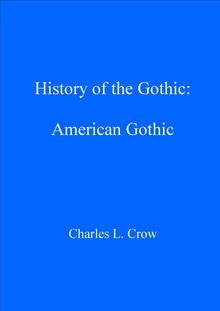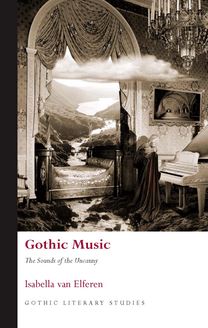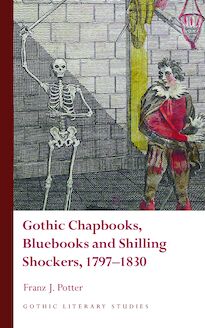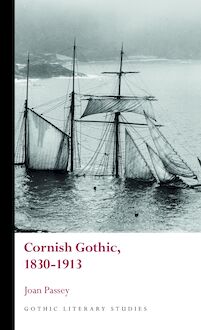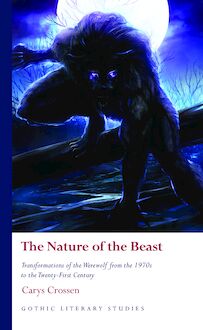Gothic Chapbooks, Bluebooks and Shilling Shockers, 1797–1830 , livre ebook
140
pages
English
Ebooks
2021
Vous pourrez modifier la taille du texte de cet ouvrage
Obtenez un accès à la bibliothèque pour le consulter en ligne En savoir plus
Découvre YouScribe et accède à tout notre catalogue !
Découvre YouScribe et accède à tout notre catalogue !
140
pages
English
Ebooks
2021
Vous pourrez modifier la taille du texte de cet ouvrage
Obtenez un accès à la bibliothèque pour le consulter en ligne En savoir plus
Publié par
Date de parution
15 janvier 2021
Nombre de lectures
5
EAN13
9781786836724
Langue
English
This study breaks new ground surveying the origins of the Gothic chapbook, its publishers and authors, in order to establish conclusively the impact these pamphlets had on the development of the Gothic genre. Considered the illegitimate offspring of the Gothic novel, the lowly chapbook flooded the market in the late eighteenth century, creating a separate and distinct secondary market for tales of terror. The trade was driven by a handful of individuals who were booksellers and dealers, circulating library proprietors, stationers, and small publishers – what they produced were more than four hundred chapbooks, bluebooks and shilling shockers containing Gothic tales from magazines, redactions of popular novels, extractions of entire inset tales, and original tales of terror. This book responds to the urgent and pressing need to contextualise the Gothic chapbook in ascertaining a more concise and comprehensive view of the entire Gothic genre.
Acknowledgements
List of Illustrations
Introduction
1 Chapbooks, Bluebooks and Shilling Shockers
2 The Rise of the Gothic Chapbook: Simon Fisher, Thomas Hurst and The Monk, 1797–1801
3 The Art of Marketing: Ann Lemoine and John Roe
4 The Golden Age of the Shilling Shocker: Thomas Tegg and the Chapbook Magazines
5 The Profiteers: Isaac Crookenden and Sarah Wilkinson
6 The Decline of the Gothic Pamphlet
Notes
Appendix: Gothic Pamphlets
Bibliography
Index
Publié par
Date de parution
15 janvier 2021
EAN13
9781786836724
Langue
English
GOTHIC CHAPBOOKS, BLUEBOOKS AND SHILLING SHOCKERS, 1797–1830
SERIES PREFACE
Gothic Literary Studies is dedicated to publishing groundbreaking scholarship on Gothic in literature and film. The Gothic, which has been subjected to a variety of critical and theoretical approaches, is a form which plays an important role in our understanding of literary, intellectual and cultural histories. The series seeks to promote challenging and innovative approaches to Gothic which question any aspect of the Gothic tradition or perceived critical orthodoxy. Volumes in the series explore how issues such as gender, religion, nation and sexuality have shaped our view of the Gothic tradition. Both academically rigorous and informed by the latest developments in critical theory, the series provides an important focus for scholarly developments in Gothic studies, literary studies, cultural studies and critical theory. The series will be of interest to students of all levels and to scholars and teachers of the Gothic and literary and cultural histories.
SERIES EDITORS
Andrew Smith, University of Sheffield
Benjamin F. Fisher, University of Mississippi
EDITORIAL BOARD
Kent Ljungquist, Worcester Polytechnic Institute Massachusetts
Richard Fusco, St Joseph’s University, Philadelphia
David Punter, University of Bristol
Chris Baldick, University of London
Angela Wright, University of Sheffield
Jerrold E. Hogle, University of Arizona
For all titles in the Gothic Literary Studies series visit www.uwp.co.uk
Gothic Chapbooks, Bluebooks and Shilling Shockers, 1797–1830
Franz J. Potter
© Franz J. Potter, 2021
All rights reserved. No part of this book may be reproduced in any material form (including photocopying or storing it in any medium by electronic means and whether or not transiently or incidentally to some other use of this publication) without the written permission of the copyright owner. Applications for the copyright owner’s written permission to reproduce any part of this publication should be addressed to the University of Wales Press, University Registry, King Edward VII Avenue, Cardiff CF10 3NS.
www.uwp.co.uk
British Library Cataloguing-in-Publication Data
A catalogue record for this book is available from the British Library.
ISBN 978-1-78683-670-0
e-ISBN 978-1-78683-672-4
The right of Franz J. Potter to be identified as authors of this work has been asserted by them in accordance with sections 77 and 79 of the Copyright, Designs and Patents Act 1988.
The publisher has no responsibility for the persistence or accuracy of URLs for any external or third-party internet websites referred to in this book, and does not guarantee that any content on such websites is, or will remain, accurate or appropriate
Cover image: Frontispiece to The black forest; or The cavern of horrors: A Gothic romance (1802).
C ONTENTS
Acknowledgements
List of illustrations
List of figures
Introduction
1 Chapbooks, Bluebooks and Shilling Shockers
2 The Rise of the Gothic Chapbook: Simon Fisher, Thomas Hurst and The Monk, 1797–1801
3 The Art of Marketing: Ann Lemoine and John Roe
4 The Golden Age of the Shilling Shocker: Thomas Tegg and the Chapbook Magazines
5 The Profiteers: Isaac Crookenden and Sarah Wilkinson
6 The Decline of the Gothic Pamphlet
Notes
Appendix: Gothic Pamphlets
Bibliography
A CKNOWLEDGEMENTS
This project would not be possible if not for the continued support from my family. I am grateful to my wife, Serena, who has been patient and understanding about my predilection, and my daughters MaCall and Eloise, who have always encouraged me ‘to finish it already’.
I would also like to thank my chair, Janet Baker, for her continued encouragement and support. National University has been particularly generous with financial support for both travel and research. Their assistance allowed me to attend and present my findings at both the PAMLA and International Gothic Association conferences over the years and is much appreciated.
The staff at the British Library, UCLA, City of Westminster Archives and National University Library were particularly helpful in locating resources, rare chapbooks and various documents. I would also like to thank Wendy Fall for her wonderful images of gothic pamphlets that she has collected, some of which are included in this work.
Finally, this book is dedicated to the memory of Sarah Wilkinson, whose struggle to support herself in the face of misfortune and tragedy continues to inspire.
L IST OF I LLUSTRATIONS
Plate 1: Frontispiece of The Black Forest; or, The Cavern of Horrors . A Gothic Romance . Photo by Wendy Fall from the Albert and Shirley Small Special Collections, University of Virginia.
Plate 2: Frontispiece of The Solemn Warning; or, The Predictions Verified. A Romance . Photo by Wendy Fall from the Albert and Shirley Small Special Collections, University of Virginia.
Plate 3: Frontispiece of The Pirate; or, The Sisters of Burgh Westra . Rare Books and Special Collections, McGill University Library.
Plate 4: Frontispiece of The Cavern of Horrors; or, Miseries of Miranda. A Neapolitan Tale . Photo by Wendy Fall from the Albert and Shirley Small Special Collections, University of Virginia.
Plate 5: Frontispiece of The Bleeding Nun of the Castle of Lindenberg; or, The History of Raymond & Agnes . Rare Books and Special Collections, McGill University Library.
L IST OF F IGURES
Figure 1.1 Gothic Pamphlets, 1797–1828
Figure 1.2 Gothic Pamphlets and Novels, 1800–28
Figure 1.3 Gothic Pamphlets, 1797–1810
Figure 1.4 Gothic Pamphlets, 1811–28
Figure 1.5 Gothic Pamphlets by Publisher
Figure 1.6 Gothic Pamphlets by Author
Figure 1.7 Adaptations v. Original
Figure 3.1 Lemoine’s Gothic Pamphlets
Figure 4.1 Tegg’s Gothic Pamphlets
Figure 5.1 Wilkinson’s Publishers
Introduction
Yet today, nearly two centuries later, the bluebook phenomenon is forgotten almost as if it never existed: ignored in most works about eighteenth and nineteenth century literature and only briefly appraised in studies of the Gothic novel.
(Peter Haining, Tales from the Gothic Bluebook , 1978)
A full-length study of the gothic chapbook is long overdue. For far too long, the chapbook has been a pariah in gothic studies: an ephemeral branch of the gothic, a derivative of ‘legitimate’ novels, and at best considered an aberration of the Gothic. However, as William Watt noted in the first and only study of the gothic chapbook, Shilling Shockers of the Gothic School (1932),
[t]o gain a complete picture of a literary fashion which attracted the readers of any definite time, we must pierce the oblivion which has obscured the evanescent productions of Grub Street. Much as we are inclined to decry the struggling hacks who have sacrificed literary standards on the altar of their own financial needs, we cannot deny their importance for the study of the tastes of a large body of readers. 1
Watt’s study, appropriately the size and length of a chapbook, provided one of the first serious appraisals of the maligned and much-derided gothic short tale of terror. Nevertheless, the study offered merely a cursory survey of the gothic chapbook’s salacious features and an all too brief glance at the ‘struggling hacks’ who wrote them and their rapacious readers.
Literary and historical studies of gothic fiction have long focused on their development as a noxious offspring of the novel rather than a legitimate downmarket manifestation. Critical works such as Joyce Tompkins’s The Popular Novel in England, 1770 – 1800 (1932), Montague Summers’s The Gothic Quest (1938) and A Gothic Bibliography (1940), Frederick S. Frank’s The First Gothics: A Critical Guide to the English Gothic Novel (1987)and David Punter’s The Literature of Terror (1996) provided important but only cursory discussions of the chapbook, often as the symptom or cause of their eventual decline. For instance, ‘[t]he chapbooks represent Gothicism in its most decadent and rampant phase’, declared Frederick S. Frank in The First Gothics , ‘bringing down upon the Gothic novel wide spread critical denunciation and ridicule.’ 2 As such, the gothic chapbook has been historically overlooked or marginalised by many literary historians.
However, the ‘decadence’ of the gothic novel should not be laid only at the feet of the lowly chapbook. In fact, these short tales of terror are more than just a footnote; they are part of the aggregate, and one worth investigating. Just as one cannot understand the gothic’s impact without examining the social, political, and economic context in which they were written, we need to broaden our view of the literary gothic to consider those downmarket productions that targeted a growing readership.
Fortunately, contemporary gothic scholarship has increasingly integrated gothic chapbooks and bluebooks into the larger literary narrative. The Handbook of the Gothic (2010), The Encyclopedia of Romantic Literature (2012) and The Palgrave Handbook to Horror Literature (2018) now have entries on them and the authors who penned them. Diane Long Hoeveler wrote extensively about the gothic chapbook in Gothic Riffs: Secularizing the Uncanny in the European Imaginary, 1780–1820 (2010), in which she explored the ‘collateral gothic’, including chapbooks, ballads and dramas. Likewise, in The Gothic Ideology: Religious Hysteria and Anti-Catholicism in British Popular Fiction, 1780 – 1880 (2014) she surveyed manifestations of anti-Catholicism in the popular media and particularly in chapbooks. In The History of Gothic Publishing, 1800 – 1835 (2005), I began to trace the production of the chapbook in relation to the gothic novel, but I only scratched the surface of an industry that was active from at least 1797 to 1828.
While access to gothic chapbooks continues to increase, the fundamental problem remains a lack of specific information about the practices of the publishing and printing industry that produced them. To this e

